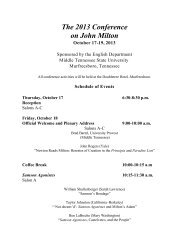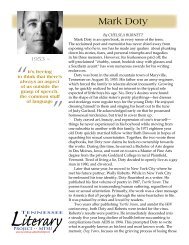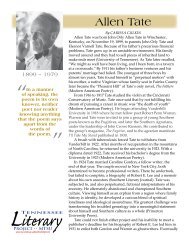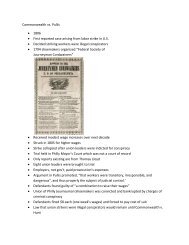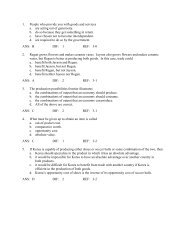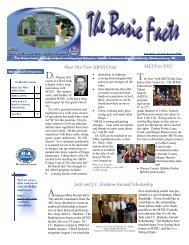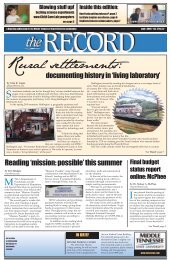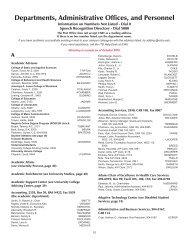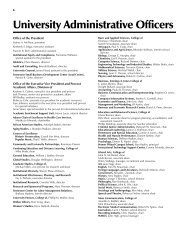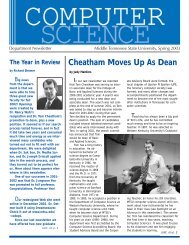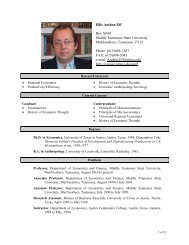Song of Silk - Middle Tennessee State University
Song of Silk - Middle Tennessee State University
Song of Silk - Middle Tennessee State University
Create successful ePaper yourself
Turn your PDF publications into a flip-book with our unique Google optimized e-Paper software.
Dear Friends and Patrons <strong>of</strong> the Arts,<br />
I would like to welcome you to a very special event as part <strong>of</strong> our Centennial Homecoming<br />
Celebration. We are honored to be hosting an exciting evening <strong>of</strong> Chinese performing arts<br />
brought to you by the Confucius Institute at <strong>Middle</strong> <strong>Tennessee</strong> <strong>State</strong> <strong>University</strong> in conjunction<br />
with the Confucius Institute <strong>of</strong> Chinese Opera at Binghamton <strong>University</strong>, NY. Tonight's<br />
presentation will feature many established and rising stars <strong>of</strong> Chinese performing arts. As we<br />
celebrate our institution's 100th birthday, this evening's program will bring a special sparkling<br />
light to our celebration.<br />
MTSU has established strong partnerships with many universities in China. These<br />
relationships provide many opportunities for cultural and educational exchange and support a<br />
number <strong>of</strong> unique collaborations for our faculty and students. We are honored to work with<br />
our Chinese university partners to promote academic excellence, diversity and cooperation.<br />
I appreciate the long history and rich culture <strong>of</strong> China and look forward to tonight's fantastic<br />
presentation <strong>of</strong> Chinese art and culture.<br />
Thank you for attending this wonderful program, <strong>Song</strong> <strong>of</strong> <strong>Silk</strong>.<br />
Sidney A. McPhee<br />
President<br />
<strong>Middle</strong> <strong>Tennessee</strong> <strong>State</strong> <strong>University</strong>
Program: <strong>Song</strong> <strong>of</strong> <strong>Silk</strong><br />
Cold Breeze through the Pines 松 风 寒<br />
Performed by Wang Lifeng on zhongruan<br />
Hubei Fan 撇 扇 Dance by Jiayan Yong<br />
Ambush from All Sides 十 面 埋 伏 Performed by Liang Ning on pipa<br />
Farewell My Concubine 霸 王 别 姬<br />
Beijing opera performed by Zhang Jing and Jia Jinsong<br />
A Moonlit River on a Spring Night 春 江 花 月 夜 Performed by Zhou<br />
Wang, Lin Li, Liang Ning, and Wang Lifeng on guzheng, pipa, and zhongruan<br />
A Ditty from the Yimeng Mountain 沂 蒙 山 小 调<br />
The Murmuring Stream 小 河 淌 水<br />
Beautiful Mood 美 丽 的 心 情<br />
Performed by Hong Zhang, mezzo‐soprano and Pej Reitz, piano<br />
Long Sleeve 水 袖 Dance performed by Guixuan Zhuang<br />
L<strong>of</strong>ty Mountains and Flowing Water 高 山 流 水<br />
Performed by Zhou Wang on guzheng<br />
New Take on a Tune “Sorrow on River Luo” 新 翻 《 罗 江 怨 》<br />
Performed by Zhou Wang on guzheng and Huang Zhenyu on Piano<br />
Cradle on Yak’s Back 牛 背 摇 篮<br />
Duet dance by Jiayan Yong and Guixuan Zhuang<br />
Beijing Opera Music Instruments 京 剧 器 乐 系 列 演 示 Performed<br />
by Jin Zhiqiang on xiaoluo, jinghu, jingerhu, yueqin, dizi, and suona<br />
Beijing opera: Sitting in the Palace 坐 宫<br />
performed by Zhang Jing and Jia Jinsong<br />
Program Notes<br />
1. Cold Breeze through the Pines 松 风 寒 The music is based on a classic<br />
Chinese poem “Listening to Music” by Liu Changqin <strong>of</strong> the Tang Dynasty<br />
(618-907). The poet expressed his sadness and disappointment <strong>of</strong> not<br />
being appreciated by the mainstream.<br />
2. Hubei Fan 撇 扇 This is a rural folk dance from the Hubei province,<br />
and it is known for its distinctive 'flicking' <strong>of</strong> silk fans.<br />
3. Ambush from All Sides 十 面 埋 伏 This is a famous Chinese classical<br />
lute (pipa) score, which was composed on the basis <strong>of</strong> a battle in 202 B.C.<br />
between the armies <strong>of</strong> Chu and Han at Gaixia, by the Wujiang River.<br />
Through its passionate and majestic tune, the audience could almost see<br />
the fierce, desolate, solemn and stirring scenes <strong>of</strong> the battle and hear the<br />
sounds <strong>of</strong> soldiers’ shouting, horse galloping, and weapon striking.<br />
4. Farewell My Concubine 霸 王 别 姬 The excerpt is set at the end <strong>of</strong> the<br />
Qin dynasty (221-206 BC). The Emperor loses control <strong>of</strong> the kingdom,<br />
and several leaders emerge from the chaos to proclaim themselves kings.<br />
Among them, two contend for supremacy: Xiang Yu, the King <strong>of</strong> Chu,<br />
and Liu Bang, the King <strong>of</strong> Han. In a crucial battle, Xiang Yu’s troops are<br />
ambushed by Liu Bang’s and gradually run out <strong>of</strong> food. And when the<br />
troops hear their native songs sung by the enemy encamped around them,<br />
they are convinced that their homeland has been conquered and their<br />
countrymen have joined Liu Bang. Foreseeing his failure, Xiang Yu drinks<br />
with his favorite concubine Consort Yu for the last time. After performing<br />
a sword dance for Xiang Yu, she commits suicide. Struck by grief from<br />
losing the battle and Consort Yu, Xiang Yu fights his way to the Wujiang<br />
River and kills himself<br />
5. A Moonlit River on a Spring Night 春 江 花 月 夜 This is one <strong>of</strong> the<br />
most famous Chinese traditional music works since the late 19th century.<br />
The beautiful musical harmony paints a tranquil scene <strong>of</strong> a river in<br />
springtime and gives a vivid impression <strong>of</strong> ripples over the water.
3<br />
6. A Ditty from the Yimeng Mountain 沂 蒙 山 小 调 This is a folksong<br />
from the Shandong Province, China. Everybody likes Yimeng Mountain<br />
because it is so pretty: a gentle breeze sweeps over sheep on the green<br />
mountain, red sorghum decorates people’s happy life.<br />
7. The Murmuring Stream 小 河 淌 水 This is a folksong from the<br />
Yunnan Province, China. The moon came out, bright and bright; my<br />
boyfriend is in the remote mountainside. You are like the moon in the sky,<br />
my dear; ah, the murmuring stream is clear and clear. A cool breeze up the<br />
green mountain, my dear, do you hear my call again and again?<br />
8. Beautiful Mood 美 丽 的 心 情 Wind sends the doves to the starry sky;<br />
the moon shines upon our happy dancing. Let our dreams grow auspicious<br />
wings; let beautiful moods follow us everywhere.<br />
9. Long Sleeve 水 袖 This is a Chinese classical dance using flowing<br />
sleeves that incorporates the concept <strong>of</strong> yin and yang and elements <strong>of</strong><br />
Beijing opera and tai chi.<br />
10. L<strong>of</strong>ty Mountains and Flowing Water 高 山 流 水 There is a beautiful<br />
story behind the music: Bo Ya, a prominent qin player during the Spring<br />
and Autumn Period (771 to 403 BC) befriended Zhong Ziqi, a woodcutter,<br />
because Ziqi was the only person able to appreciate the haughty mountains<br />
and the running streams that Bo Ya tried to “describe” in his music. One<br />
day, after learning <strong>of</strong> Ziqi’s death, Bo Ya was so sad that he shattered the<br />
instrument and vowed never to play again, since no one else could<br />
understand his music like Ziqi did.<br />
and in their religion, the Tibetan people have worshipped the yaks. This<br />
piece incorporates the slow, swaying movements <strong>of</strong> the ox.<br />
13. Beijing Opera Music Instruments 京 剧 器 乐 系 列 演 示 A Beijing<br />
opera orchestra is divided into two groups. One is called wen chang,<br />
whose main function is to accompany actor’s singing. Wen chang is<br />
dominated by a stringed instrument called jinghu and is supplemented by<br />
plucked instruments such as yueqin and pipa. The other is wu chang,<br />
whose main function is to accompany acting, recitation, dancing and<br />
acrobatic fighting on stage. Wu chang usually plays percussion music<br />
instruments, such as drums, wooden clappers, gongs and cymbals.<br />
14. Sitting in the Palace 坐 宫 “Sitting in the Palace” is an excerpt from a<br />
famous jing ju (Beijing opera) play, Silang Visits His Mother. The play is<br />
set in the Northern <strong>Song</strong> Dynasty (960–1127), when the kingdom<br />
alternated between warfare and diplomacy with the Liao people in the<br />
northeast. In a battle against the troops <strong>of</strong> Liao, General Yang Silang’s<br />
father and brothers are killed. Captured by Liao armies, Silang does not<br />
reveal his true identity to anyone. The empress <strong>of</strong> Liao later betroths her<br />
daughter to Silang. Silang and the princess love each other very much and<br />
later have a son. One day, Silang hears his mother, a general, is in a<br />
fortified city <strong>of</strong> Liao to wage war. He is very eager to see his mother after<br />
15 years; however, he cannot pass the guarded gates unless he gets a<br />
golden arrow from the empress. Silang then reveals his true identity to the<br />
princess and asks her for help.<br />
11. New Take on a Tune “Sorrow on River Luo” 新 翻 《 罗 江 怨 》 <br />
“Sorrow on River Luo” is a guzheng tune from Shanxi area. Zhou Yanjia<br />
and Huang Zhenyu, two composers, put a new spin on the old tune.<br />
12. Cradle on Yak’s Back 牛 背 摇 篮 This is a Tibetan dance. Tibet is in<br />
western China, north <strong>of</strong> the Himalayas. In Tibet, yaks are very important<br />
to the society and economies <strong>of</strong> local people. Throughout their history
About the Performers<br />
HUANG Zhenyu 黄 枕 宇 received a bachelor’s degree<br />
in piano, and later a master’s degree in translation <strong>of</strong><br />
music literature and the theory and technique <strong>of</strong><br />
electronic music. Teaching at the Central Conservatory<br />
<strong>of</strong> Music, Huang published several academic papers on<br />
music. He has also composed music for movies,<br />
including When Ruo Ma Was Seventeen (2004) and The<br />
Red Awn (2007).<br />
JIA Jinsong 贾 劲 松 received a master’s degree in<br />
Beijing Opera from the National Academy <strong>of</strong> Chinese<br />
Theatre Arts (NACTA) in 2004, and he has been<br />
teaching at NACTA since. A winner <strong>of</strong> national<br />
performance competitions, Jia specializes in playing<br />
laosheng (middle-aged and elder male) characters. He is<br />
currently teaching Beijing opera courses in the capacity<br />
<strong>of</strong> visiting lecturer <strong>of</strong> theater at Binghamton <strong>University</strong>.<br />
JIN Zhiqiang 金 志 强 started to work as an instructor<br />
and performer at NACTA since 1993, and he received<br />
a master’s degree in Music from NACTA in 2010. Jin<br />
is a versatile musician who plays Chinese bamboo<br />
flute, jinghu, suona, and other Chinese music<br />
instruments. He is currently a visiting associate<br />
pr<strong>of</strong>essor <strong>of</strong> music at Binghamton <strong>University</strong>.<br />
Jia Yan YONG began studying and performing ballet with the Shanghai<br />
Little Swan Ballet Troupe while in China. After arriving in New<br />
York, she danced at the J<strong>of</strong>frey Ballet School. She has studied under Yin<br />
Mei, Joseph Mills, Diane Sichel, and Patrick Widrig. Yong has performed<br />
at the Queens Museum <strong>of</strong> Art, Downtown Dance Festival, City Center,<br />
Lincoln Center Out <strong>of</strong> Doors 2007, and Solstice in Times Square. She<br />
was also a guest instructor at Hunter College.<br />
Hong ZHANG 张 泓 holds a master <strong>of</strong> music<br />
degree in voice performance from Binghamton<br />
<strong>University</strong>, and a bachelor <strong>of</strong> music degree in<br />
voice performance from the <strong>University</strong> <strong>of</strong><br />
Wisconsin-Madison. Currently a senior lecturer <strong>of</strong><br />
Chinese at Binghamton <strong>University</strong>, she is the<br />
founder and director <strong>of</strong> <strong>Song</strong> <strong>of</strong> <strong>Silk</strong>. Her recent<br />
performances include solo concerts at Purdue<br />
<strong>University</strong>, Elmira College, SUNY College <strong>of</strong><br />
Optometry, Western Michigan <strong>University</strong>, the<br />
<strong>University</strong> <strong>of</strong> Michigan, and Portland <strong>State</strong> <strong>University</strong>.<br />
ZHANG Jing 张 晶 graduated from NACTA and<br />
taught Beijing opera at NACTA since 2001. Zhang<br />
studied qingyi (demure female) roles with the<br />
Beijing opera master Mei Baojiu, who is the son <strong>of</strong><br />
the legendary Beijing opera maestro, Mei Lanfang.<br />
Author <strong>of</strong> many articles on the art <strong>of</strong> Beijing opera,<br />
Zhang performed and lectured in many countries,<br />
such as Japan, Singapore, Thailand, Russia, Spain,<br />
Finland, and the United <strong>State</strong>s. She is currently a visiting pr<strong>of</strong>essor <strong>of</strong><br />
Beijing opera at Binghamton <strong>University</strong>.
LIANG Ning 梁 宁 is a pipa (Chinese lute, fourstringed<br />
plucked instrument) player. She has been<br />
teaching at NACTA since 2000, and received a<br />
master’s degree in music from the Central<br />
Conservatory <strong>of</strong> Music in 2007. She has won at<br />
many national pipa competitions and serves as judge<br />
at pipa competitions.<br />
Pej REITZ is currently on the faculty <strong>of</strong><br />
Binghamton <strong>University</strong> and Ithaca College School <strong>of</strong><br />
Music. She holds degrees in piano performance with<br />
accompanying emphasis from Boston <strong>University</strong>, the<br />
New England Conservatory and Binghamton<br />
<strong>University</strong>. She has accompanied throughout the<br />
United <strong>State</strong>s and in England and Austria, and has<br />
performed in concerts with clarinetist Timothy Perry<br />
in South America, France, Belgium and Japan.<br />
ZHOU Wang 周 望 graduated from the Central<br />
Conservatory <strong>of</strong> Music (CCM) in Beijing, China and<br />
has been teaching at CCM since. As an experienced<br />
and highly praised guzheng musician, Zhou has<br />
recorded several CDs and published articles on<br />
guzheng and guzheng teaching. She also toured and<br />
gave lectures at many countries, including the United<br />
<strong>State</strong>s and Japan.<br />
ZHUANG Guixuan graduated from the Beijing<br />
Dance Academy in 2009, majoring in Chinese Folk<br />
Dance performance. While studying at the<br />
Shandong Province <strong>Song</strong> & Dance Academy,<br />
Zhuang frequently represented his school in<br />
international performances. Zhuang danced in the<br />
Mongolian dance piece, Wolf Totem that won<br />
second place in the 8th Taolibei National Dance<br />
Competition. He has also participated in the 2008<br />
Beijing Olympics opening ceremony piece, <strong>Silk</strong> Road, and in the 2007<br />
celebration marking the 10-year anniversary <strong>of</strong> Hong Kong’s return to<br />
China.<br />
Macau.<br />
WANG Lifeng 王 利 峰 specializes in sanxian (a<br />
three-stringed fretless plucked instrument) and<br />
zhongruan (Chinese moon guitar, a plucked stringed<br />
instrument) performances. He has been teaching at<br />
NACTA since 2000, and received a master’s degree<br />
in music from NACTA in 2007. Having recorded<br />
several CDs on sanxian music, Wang also toured and<br />
performed at many places, including Hong Kong and<br />
About the Confucius Institute at <strong>Middle</strong> <strong>Tennessee</strong><br />
The Confucius Institute at <strong>Middle</strong> <strong>Tennessee</strong> <strong>State</strong> <strong>University</strong> was established in<br />
partnership with Hangzhou Normal <strong>University</strong> <strong>of</strong> China, with the sponsorship and<br />
authorization <strong>of</strong> the Office <strong>of</strong> Chinese Language Council International (Hanban), under<br />
the Ministry <strong>of</strong> Education, China.<br />
The mission <strong>of</strong> the Confucius Institute at <strong>Middle</strong> <strong>Tennessee</strong> <strong>State</strong> <strong>University</strong> (CIMTSU)<br />
is to enhance the understanding <strong>of</strong> Chinese language and culture, facilitate engagement<br />
with China and create opportunities for exchange and collaboration between communities<br />
in <strong>Tennessee</strong> and China. The Institute seeks to become a hub for China-related activities<br />
and a resource center for Chinese language, history, contemporary society and culture.



